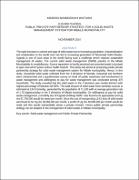Public private partnership strategy for a solid waste management system for Mbale municipality
Abstract
The rapid increase in volume and type of solid waste due to increasing population, industrialization and urbanization in the world over has led to increasing generation of Municipal Solid Wastes. Uganda is one of such areas in the world facing such a challenge which requires sustainable management of wastes. The current solid waste management (SWM) practice in the Mbale Municipality is unsatisfactory. Source separation is hardly practiced and unsorted waste is dumped in open area which poses serious health hazards. This study was aimed at proposing public private partnership strategy for solid waste management system for Mbale municipality. Hence, in this study, household solid waste collected from the 3 divisions of Wanale, Industrial and Northern were characterized and a questionnaire survey on level of public awareness and involvement in waste management and willingness to pay for waste management was conducted among 375 households. The study revealed that the solid waste in the 3 divisions was mostly kitchen with highest percentage of between 83-85%. The total amount of solid waste from domestic sources is estimated at 124.5 tons/day, generated by the population of 71,130 with an average generation rate of 1.75 kg/person/day in the 3 divisions of Mbale municipality. On willingness to pay for solid waste management, a monthly due of Uganda shillings 5000= was found to be appropriate and Ug shs 87,750,000 would be raised per month. Since the cost of transporting 124.5 tons of solid waste was found to be Ug shs 39,060,000 per month, a profit of Ug shs 48,690,000 per month would be made and this would substantially attract a private investor. Hence public private partnership strategy can be adopted in the management of solid wastes in Mbale municipality.
Key words: Solid waste management and Public-Private Partnership

